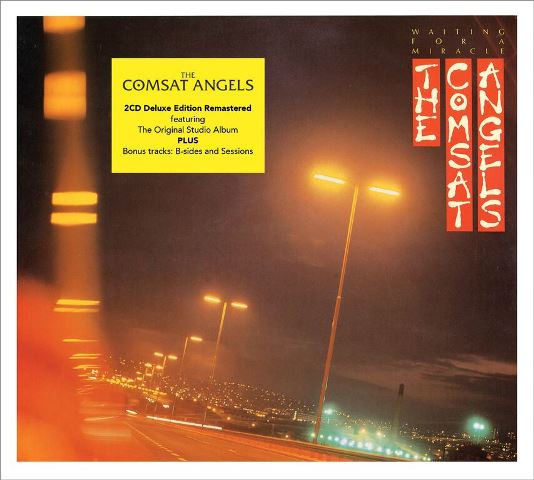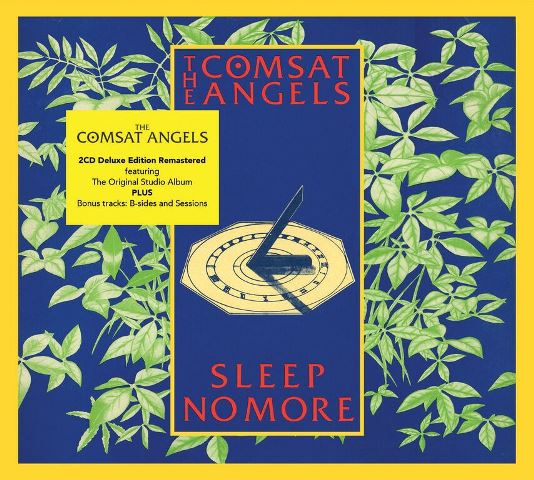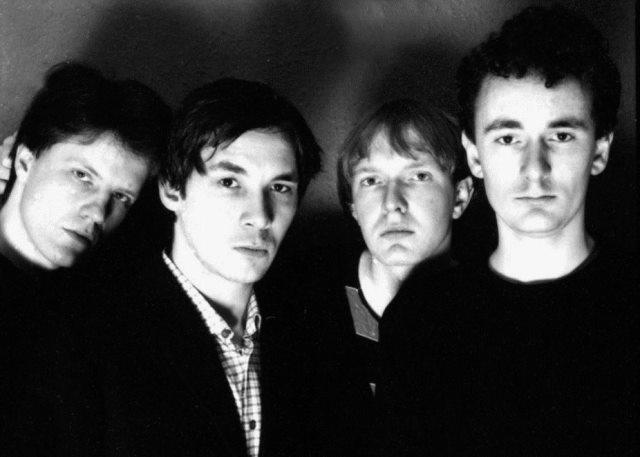The Comsat Angels’ debut single for Polydor, July 1980’s “Independence Day”, was an instant classic. After setting a rhythmic bed, each subsequent instrumental contribution is measured out: a guitar string's harmonic; a spare keyboard line; drop-outs drawing from dub. The melody was anthemic, yet not overbearing, and the forward momentum unyielding. It still sounds fantastic.
After an independently issued single, the Sheffield quartet released “Independence Day” on the major label which had brought The Jam and Siouxsie & the Banshees into the charts. In the wake of punk, Polydor seemed to have come to grips with musical individualists and how to bring them to wide audience.
 But, for The Comsat Angels, there were few signs of breaking through commercially: a reissue of “Independence Day” briefly scraped the charts in 1984 and three of their albums achieved Top 100 sales. Yet they made six albums over 1980 to 1986, issued a seventh under the name Dream Command in 1990 and returned as The Comsat Angels in 1992.
But, for The Comsat Angels, there were few signs of breaking through commercially: a reissue of “Independence Day” briefly scraped the charts in 1984 and three of their albums achieved Top 100 sales. Yet they made six albums over 1980 to 1986, issued a seventh under the name Dream Command in 1990 and returned as The Comsat Angels in 1992.
The reissue of a sizeable chunk of their back catalogue brings an opportunity to appreciate and set The Comsat Angels in context. They are often overlooked in accounts of post-punk. Each of the four new reissues is a double CD in a double fold-out digi-pack with a booklet and straightforward, unanalytical liner notes drawing from interviews with the band’s Stephen Fellows. Their first album Waiting for a Miracle (1980) is supplemented by B-sides, demos, outtakes, two Peel sessions and their Junta Records debut single. Sleep No More (1981) is similarly bulked out, as is 1982’s Fiction. Chasing Shadows (1986) is supplemented by the 1990 Dream Command album Fire on the Moon. Their Jive label albums Land (1983) and 7 Day Weekend (1985) are not reissued.
The Comsat Angels were Kevin Bacon (bass), Stephen Fellows (guitar, vocals), Mik Glaisher (drums) and Andy Peake (keyboards). Though they formed in 1976 as The Skylids and took the name Radio Earth in 1977, Fellows says in the liner notes that, despite the prevailing trend, he “hated punk. Not only did I dislike the fascistic aspect and the way some of the bands dabbled with Nazi imagery, but musically it was actually really boring. We were quite skilled players, so the effect punk had on us was that it made us focus on manufacturing music that went beyond just basic three-chord thrashing.”
 Supporting Pere Ubu in November 1978 was the catalyst for change. Fellows recalls that “back then we were playing a kind of muso mush; like a cross between Be Bop Deluxe and Hatfield & the North. Pere Ubu made us sound totally redundant. After that, we stripped our sound right back and we knew we had to avoid our previous influences. We changed totally. We were quite brutal about it, but we came back sounding far more minimal and with a fresh sense of purpose.” And a new name too: The Comsat Angels.
Supporting Pere Ubu in November 1978 was the catalyst for change. Fellows recalls that “back then we were playing a kind of muso mush; like a cross between Be Bop Deluxe and Hatfield & the North. Pere Ubu made us sound totally redundant. After that, we stripped our sound right back and we knew we had to avoid our previous influences. We changed totally. We were quite brutal about it, but we came back sounding far more minimal and with a fresh sense of purpose.” And a new name too: The Comsat Angels.
A Radio Earth single (titled “Ring Ring Shrink Shrink”) had been scheduled for release by Radar Records in October 1978 after the band had signed with the label in August (this episode is not mentioned in the liner notes). The single never came out and the renamed band instead issued its debut single “Red Planet” on their own Junta label in March 1979. They then signed with Polydor and began recording Waiting for a Miracle in London in January 1980.
Sheffield was incredibly fertile musically at this time. ABC achieved massive success in 1982, but had been active since 1977 as Vice Versa. Cabaret Voltaire were making waves. Clock DVA (who also signed with Polydor) were ploughing a dark musical furrow. The Human League were already nationally known. Although undoubtedly aware of these seminal bands, none of which dealt in the punk Fellows disliked, the liner notes do not delve into The Comsat Angels’ relationship with Sheffield and its music or Fellows’ views on his band's contemporaries and whether they impacted on The Comsat Angels.
 Listening to Waiting for a Miracle, Sleep No More and Fiction now, it is initially hard to grasp why The Comsat Angels are not as lauded as the bands noted above. Each album is dark, sets its mood and is packed with songs which niggle. Edginess and nerviness are core to both the songwriting and playing. Atmosphere and texture are key in the band’s spare approach to arranging their songs. Obviously, the intensity of Joy Division (another band Radar tried to sign) is lacking, but a brooding melancholy is attractive and has not dated. Liverpool’s Modern Eon and South London’s The Sound were fellow travellers in this style.
Listening to Waiting for a Miracle, Sleep No More and Fiction now, it is initially hard to grasp why The Comsat Angels are not as lauded as the bands noted above. Each album is dark, sets its mood and is packed with songs which niggle. Edginess and nerviness are core to both the songwriting and playing. Atmosphere and texture are key in the band’s spare approach to arranging their songs. Obviously, the intensity of Joy Division (another band Radar tried to sign) is lacking, but a brooding melancholy is attractive and has not dated. Liverpool’s Modern Eon and South London’s The Sound were fellow travellers in this style.
Chasing Shadows, which was co-produced by Robert Palmer, is less effective and suggests – in the grand sweep of its slower songs – an attempt to court a similar audience to Simple Minds. The band was trying to reach out: the liner notes mention a New York show supporting The Ramones “whose hardcore audience responded to the Comsat’s set with total silence”. Fire on the Moon – recorded as Dream Command as there were legal issues with the use of the word “Comsat” (in America they were known as CS Angels) – is poor, has dated badly and further flirts with the stadium-friendly approach.
But the music of the first three albums could have set The Comsat Angels on a path to a Cure-like success. This was not achieved. Unlike The Cure, the band did not have an image. They toured with U2 in 1981, but none of their ambition and upward momentum rubbed off on The Comsat Angels. They were not as individual, and then not as poppy, as their Sheffield contemporaries ABC and The Human League. The Comsat Angels were post-punk’s nearly men.
At least now, over three decades on, the music of the early Comsat Angels is enough to make their case.















Add comment